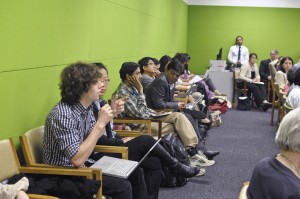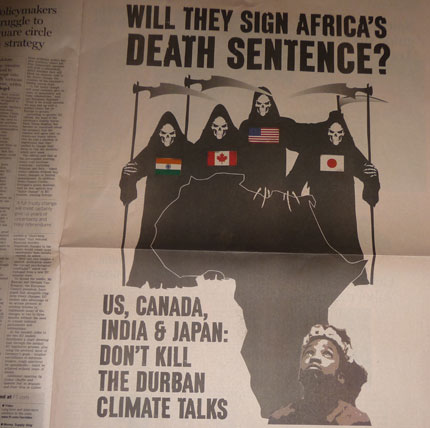By: Mariana Calderon
As part of the Major Group of Children and Youth and as a student studying international policy, I am very interested in what my role at international negotiations can be. In this respect, I am just one of a very large number of individuals, organizations, and groups – Major Groups, that is. There are nine major groups recognized by Agenda 21, and part of the discussion on the IFSD addresses the participation of Major Groups and other stakeholders in the international negotiation process. This initiative has been rooted in discussions in a push to uphold the Rio Declaration and Agenda 21 (both specifically mention the importance of stakeholder involvement, through the “participation of all concerned citizens,” and the “commitment and genuine involvement of all social groups…in decision-making”). Up until now, civil society involvement in the negotiating process has been limited to observation and lobbying – except for in a few more progressive conventions (such as the CBD, and specifically in the negotiations on the Nagoya Protocol), meetings have generally shut out many of those most invested in the results. It is not surprising, then, that many Major Group and civil society members are working for improved participation in the UN process as an outcome of Rio+20.
This was the topic of a side event I attended on Tuesday (20/3): The Role of Civil Society/Major Groups in the Future IFSD. Panelists included representatives from the Stakeholder Forum, the Local Authorities Major Group, and the U.S. Department of State. Much of the discussion revolved around what was phrased as the “plight” of the UN: Institutions develop slowly and often painfully, and begin to decay when the systems fail to adjust to new “realities” and environments. Current UN institutions face two challenges – lack of implementation, and the lack of a multi-stakeholder process. The involvement of civil society is often seen as a sort of panacea; once decision-making becomes inclusive, stakeholders could push for more progressive actions, leading to adaptive institutions and an increase in implementation. On the other hand, there is also some fear that once civil society becomes more involved, we will become scapegoats for lack of implementation. Nonetheless, there is a general agreement that Major Groups and other stakeholders must be allowed to participate in decision-making in order to bridge the gap between the current system and the changing environment. The question then, is, how can this be made to happen?
Because re-opening the UN charter to include language for stakeholder involvement would be a messy and almost certainly ineffective strategy, only three strategies for creating an inclusive decision-making process are typically discussed. The first and second involve reforming and strengthening existing institutions, the Commission on Sustainable Development and/or, reaching higher, ECOSOC itself. The third is one of the most talked about possibilities for Rio: The establishment of a Sustainable Development Council. Much of the discussion on Major Group involvement repeatedly touched on this idea; it would be easier to allow action and involve stakeholders with a mandate and structure written in 2012 than to struggle to work with the older structures of CSD and ECOSOC.
Jan-Gustav Strandenaes of the Stakeholder Forum was the first speaker, and the first to bring up the idea of a SD Council. He stressed the need for a system that could deal with new “realities” as they occurred, and which could champion sustainable development at all levels. The new realities that he spoke of dealt not only with the changing environment, but also the changing attitude of civil society – increasingly, “people influence, decide, and are where the money is,” and of course, when you speak of a robust and adaptable system, you are really speaking of one that has money.
The next panel member to speak was Neth Daño, from ETC group in the Philippines, and member of the International Environmental Governance (IEG) Advisory Group. She advocated for the development of broader and deeper mechanisms and spaces for the engagement of groups involved at levels below the international sphere. She asked us to take note of the “brave experiments” of other civil society involvement processes, such as in the World Committee on Food Security, which has freely allowed speaking rights to civil society (though not voting rights), and she challenged us to “push the door opened by these processes even farther and take over!”
Maruxa Dardama, Network of Regional Governments for SD, discussed the concept of multi-level governance and the fact that implementation of SD occurs primarily at local and regional levels. She also advocated for a new category of non-state actors: “Governmental Stakeholders” (while noting the irony in having a MG for Local Authorities – fully fledged governing structures which cannot fully participate in International Environmental Governance).
In the remaining time of the session, there were responses from various sectors, as well as general comments and input. References were made to the many institutions outside of the “core” UN system that play important roles in SD; financing institutions and corporate powers, for example, play a large role and should be allowed to participate, but there also is a need to achieve some semblance of discipline in these groups. Additionally, the importance of keeping a multi-stakeholder process transparent was also stressed – Tomás González, UN Non-Governmental Liaison Service, pointed out that making key documents available to everyone would allow for better engagement by society. This hit particularly close to home as [Earth], along with many other non-State groups, has had to work with leaked documents in order to follow negotiations here in NY.
One other suggestion, to develop a compendium of voluntary commitments from both State and civil society actors, was made by John M. Matuszak, U.S. Department of State. This is intriguing for two reasons: First, because a collection of voluntary commitments may look pretty, but, as we all know by now, “voluntary” usually equates to “ornamental.” Secondly, and particularly, the suggestion is curious when one considers the discussion early on in negotiations about the inclusion of “Heads of State” vs. “Representatives of Peoples of the World” vs. “…and other leaders including representatives of civil society,” in the preambular text. The discussion is really about who the responsibilities should officially fall to, and while I’m inclined to say “Everyone,” everyone thinks it should be, in particular, “everyone else.” This is the unmentionable part of increasing participation by civil society. Yes, civil society seems to be more aware of our responsibilities (or at least, we own up to it more often), but there will be consequences once it is officially in text, previously mentioned scapegoat syndrome included. The more hard-won our participation is, the harder we will have to work to live up to our own expectations.
This is a small price to pay, however, for true representation. Meena Raman from the Third World Network pointed out that this is not just about access, but also about who is making decisions, and who actually is being heard. While right now, Major Groups have an indirect voice (Brice Lalonde, Executive Coordinator for Rio+20, told [Earth] as much in an interview, claiming that we have a larger voice, and more power, than we think), there is a major difference between writing letters or lobbying delegates, and having direct representation and a voice that always has a mic at hand.

Julian addressing the room at the Major Groups/Civil Society side event
Julian stated as much to the room, reminding participants that the governments no longer represent us in this process, and that it has become a matter of representing ourselves – not just the youth, but all the other members and groups of civil society. Julian spoke of the frustration we feel as we sit in the back of the room, taking notes on what delegates say, and sincerely wishing we could “have the floor,” both to support our allies, and point out the haphazard logic so often used to justify changes to the text that are detrimental to our mission for sustainable development. Others in the room related to this frustration, and spoke words of encouragement, telling us to hold fast to our optimism and drive. Neth Dano, in particular, has kept her unbridled optimism, assuring us that she too, hopes to be proud to tell her children that she “was a part of this gang of vagabonds, and adventurists!”
I know I, at least, am clinging to my optimism tooth and nail, for, as Neth told me, it’s the only way to survive in these halls. My optimism doesn’t depend on what happens in the negotiating room, however. It stems from participation in groups such as this one, at side events, in the hallways, and in the café, where delegates and participants can become people again, with innovative ideas, open minds, and words of encouragement for each other. The range of topics discussed in Conference Room B was wide, but it all came down to responsibility, and seeing everyone’s willingness and even enthusiasm to assume this responsibility by pushing for increased participation has been one of the most heartening parts of returning to the often-dreary world of international negotiations.
Lalanath De Silva asked the room “What will be your legacy?” I know what I want my future, and my legacy, to be like, and I’m ready to fight to be able to help create it.




